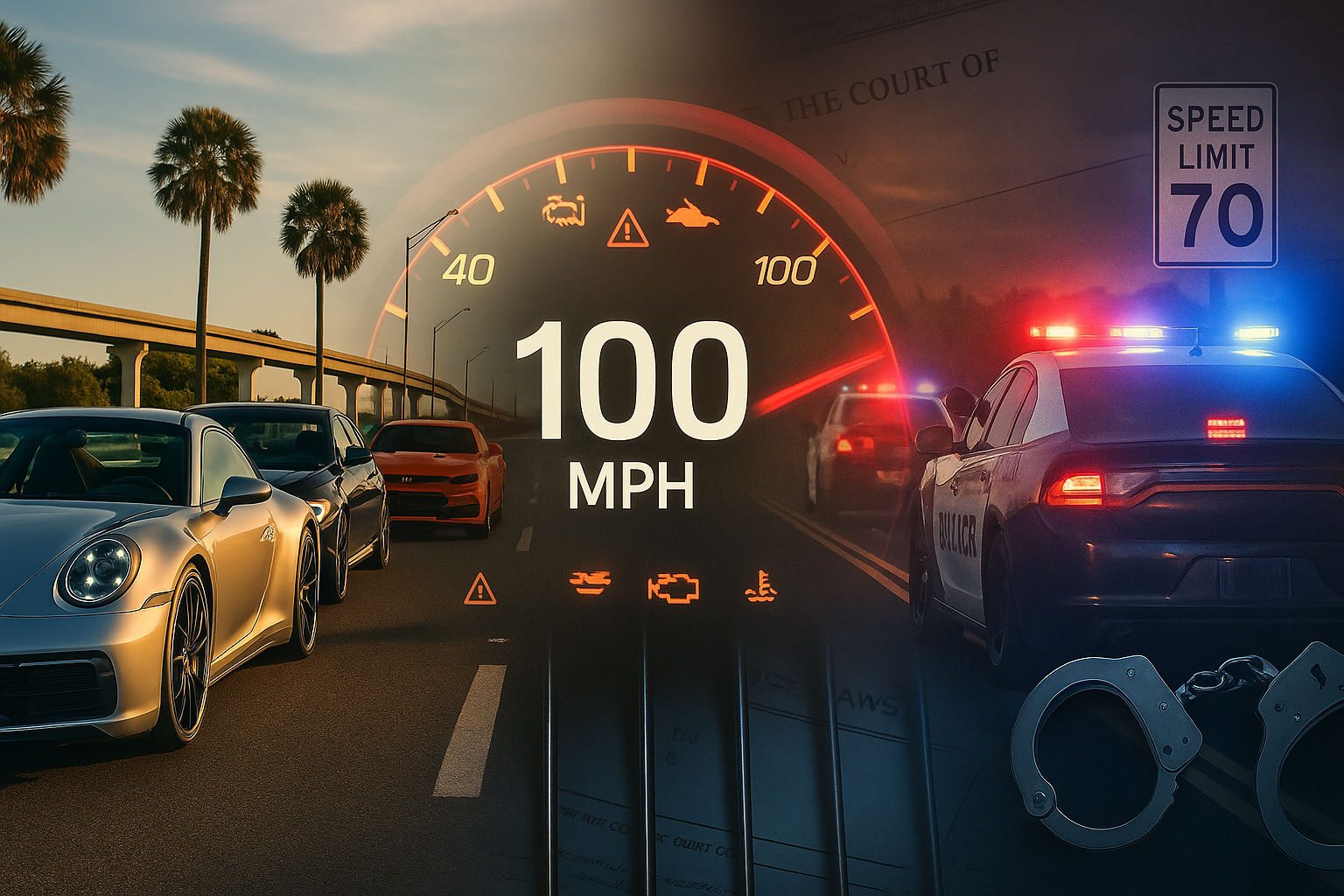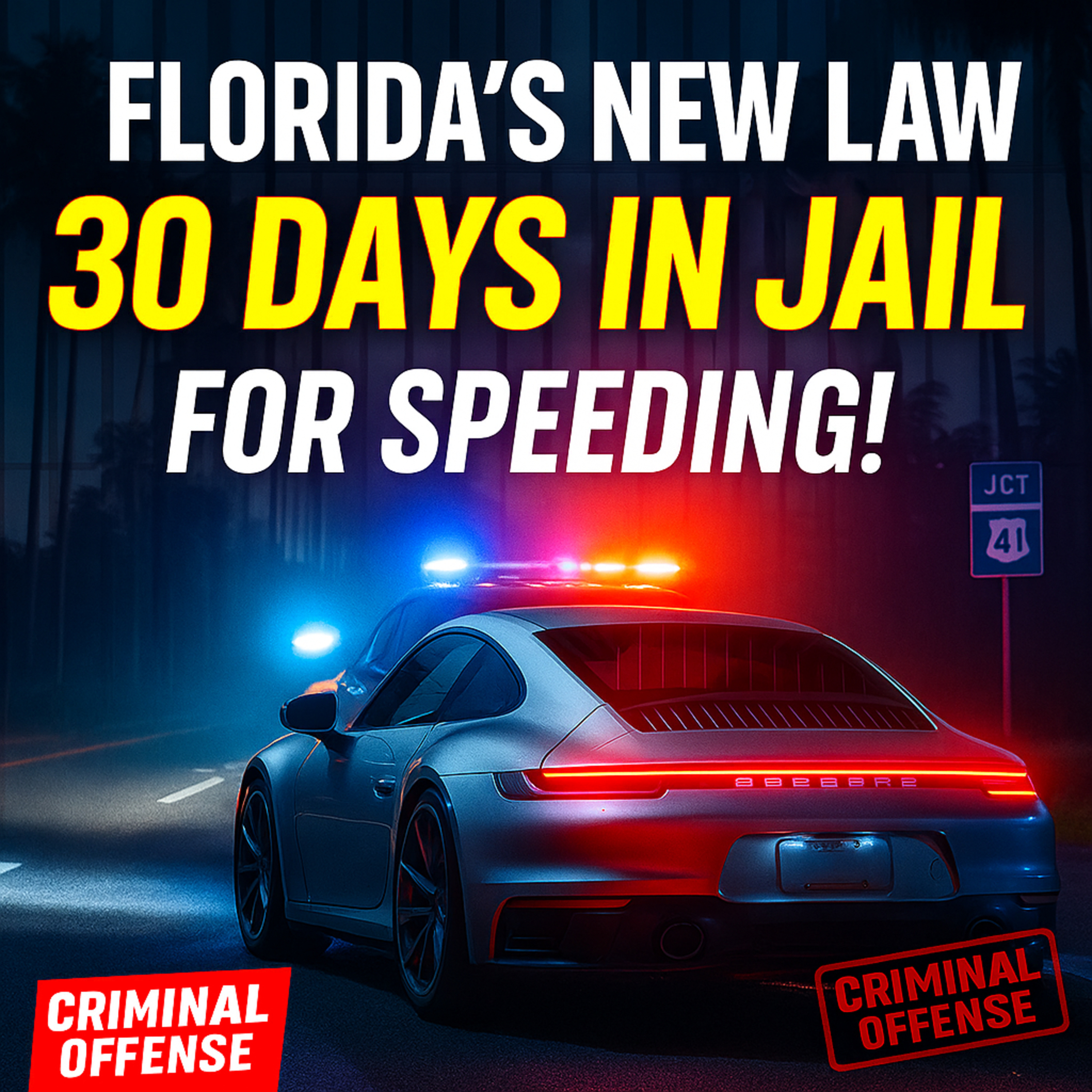How Florida's Controversial Super Speeder Law is Reshaping Car Culture Forever

How Florida's Controversial Super Speeder Law is Reshaping Car Culture Forever
The automotive community is in chaos as new legislation threatens the very foundation of performance driving
The Florida car scene just experienced a seismic shift that's sending shockwaves through the entire automotive community. What started as another casual episode of The Shift Talkers podcast quickly evolved into an urgent discussion about survival in the new legal landscape facing car enthusiasts.
When Passion Meets Prison Time
Franco, host of The Shift Talkers, made a bombshell announcement that perfectly encapsulates the current state of Florida's car culture: he's selling his beloved Porsche 992 Carrera S. This isn't about upgrading or financial necessity—it's about fear. Fear of a new law that treats spirited driving like a violent crime.
Florida's House Bill 351, known as the "Super Speeder Law," has fundamentally changed the game. Drive 100 mph or exceed the speed limit by 50 mph, and you're no longer looking at a simple traffic ticket. You're facing criminal charges, potential jail time, and the very real possibility of having your car permanently confiscated by law enforcement.
The New Reality: Criminal Charges for Speed
The law's impact extends far beyond simple fines:
Automatic Criminal Penalties:
- 100+ mph = Misdemeanor charges
- 50+ mph over posted limit = Criminal offense
- Up to 30 days in county jail
- Permanent vehicle confiscation (if owned outright)
- Criminal record implications
What makes this particularly devastating for the car community is the permanence of these consequences. Unlike traditional speeding tickets that result in points and fines, these charges create lasting criminal records that can affect employment, insurance, and future opportunities.
A European Adventure Amid Legal Chaos
Against this backdrop of legal uncertainty, Franco shared his recent Italian adventure—a stark contrast between automotive freedom abroad and the restrictions at home. His discovery of the BMW G80 M3 Wagon in Europe highlighted another frustration: amazing performance cars that aren't available in the U.S. market.
The trip also delivered an unexpected celebrity encounter when the podcast crew accidentally blocked a crowd waiting to see Al Pacino, leading to an impromptu meet-and-greet that perfectly captured the spontaneous nature of travel and automotive adventures.
The Great Car Exodus: Performance Vehicle Fire Sale
The psychological impact of the new law is already reshaping buying decisions across Florida. Franco's move from his Porsche to a potentially more "practical" BMW F90 M5 represents a broader trend—enthusiasts are reconsidering their automotive choices based on legal risk rather than pure passion.
The F90 M5 represents an interesting compromise: a family-friendly sedan that happens to produce 617 horsepower and can be easily modified to approach 800 horsepower. It's the automotive equivalent of hiding in plain sight—serious performance wrapped in respectable packaging.
Legal Loopholes and Survival Strategies
One of the most revealing discussions centered around potential workarounds to the vehicle confiscation clause. The hosts discovered that financed vehicles cannot be seized as easily as those owned outright, leading to the ironic situation where car enthusiasts might deliberately avoid paying off their vehicles to protect them from government seizure.
This has created an absurd reality where financial responsibility (owning your car outright) actually increases your legal vulnerability.
The Broader Implications for Automotive Culture
The episode revealed deeper concerns about the future of car culture in America:
Cultural Impact:
- Track days and organized events become more valuable as street driving becomes riskier
- Performance modifications may shift focus from power to stealth
- Geographic migration as enthusiasts consider moving to more car-friendly states
- Generational divide as younger enthusiasts face harsher penalties
Technical Considerations:
- Radar detector sales likely increasing dramatically
- Interest in "ghost mode" vehicle modifications
- Focus on cars that don't attract law enforcement attention
- Shift toward financed rather than owned vehicles
International Perspective: What America Can Learn
The hosts' discussion of driving laws in other countries highlighted how American approaches to speed enforcement often ignore successful international models. Countries like Germany demonstrate that higher speed limits, when combined with proper driver education and vehicle standards, can actually result in lower accident rates.
Finland's income-based speeding fines present another interesting model—creating proportional consequences that affect wealthy and poor drivers equally, rather than the current system where fines represent a minor inconvenience for some and devastating financial hardship for others.
The Road Ahead: Adaptation and Evolution
As the automotive community grapples with this new reality, several trends are emerging:
Short-term Adaptations:
- Increased track day participation
- Geographic relocation to car-friendly states
- Shift toward more subtle performance vehicles
- Enhanced focus on defensive driving techniques
Long-term Implications:
- Potential for organized advocacy and legislative change
- Development of specialized driving licenses or endorsements
- Industry response in vehicle design and marketing
- Evolution of car culture toward legal alternatives
Finding Balance: Safety vs. Freedom
While the safety intentions behind the Super Speeder Law are understandable, the implementation raises questions about proportionality and effectiveness. The hosts noted that many accidents result from speed differentials rather than absolute speed, suggesting that consistent left-lane discipline and improved driver education might be more effective than criminal penalties.
The most concerning aspect may be the potential for increased dangerous behavior—drivers who know they're facing jail time regardless might be more likely to attempt to evade law enforcement, creating far more dangerous situations than the original speeding offense.
Conclusion: A Community in Transition
The Shift Talkers Episode 5 captured a pivotal moment in American car culture. What began as a casual discussion about Italian supercars and Al Pacino encounters evolved into a sobering examination of how quickly legislative changes can reshape an entire community's behavior.
Franco's decision to sell his Porsche represents more than one man's choice—it's a symbol of a community adapting to survive in an increasingly hostile legal environment. Whether this adaptation preserves the spirit of automotive enthusiasm or fundamentally changes it remains to be seen.
The conversation also highlighted the resilience and creativity of car enthusiasts. From exploring legal loopholes to considering interstate migration, the community is actively seeking ways to preserve their passion within the new constraints.
As other states watch Florida's experiment with harsh speeding penalties, the broader automotive community must grapple with fundamental questions about the balance between safety, freedom, and the role of cars in American culture.
The road ahead may be uncertain, but one thing remains clear: the passion that drives car culture is strong enough to adapt, evolve, and ultimately survive—even in the face of unprecedented legal challenges.
Keywords: Florida Super Speeder Law, car culture, automotive community, performance vehicles, BMW M5, Porsche 992, criminal charges speeding, vehicle confiscation, driving laws, car enthusiasts, automotive podcast, street racing laws, performance driving, speed limits, automotive legislation
Hashtags: #FloridaSuperSpeederLaw #CarCommunity #TheShiftTalkers #AutomotiveCulture #PerformanceCars #SpeedingLaws #CarEnthusiasts #BMW #Porsche



